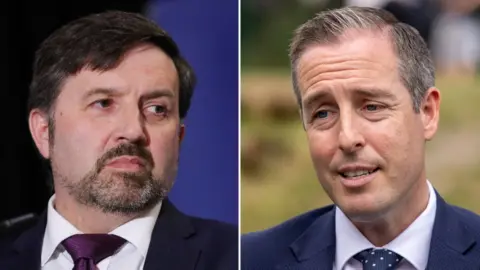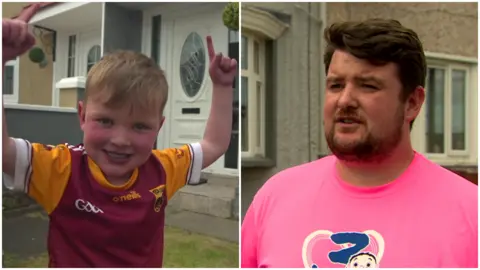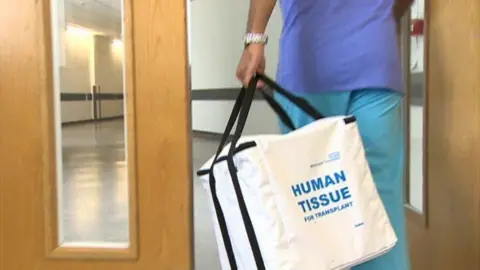Organ donation opt-out laws to proceed after Stormont talks
 Pacemaker/PA
Pacemaker/PALong-awaited laws on opt-out organ donation in Northern Ireland have been given approval to proceed after talks at Stormont.
First Minister Paul Givan announced the decision on social media on Thursday.
It followed talks between Mr Givan, Health Minister Robin Swann, who proposed the legislation, and campaigners.
Mr Givan said the legislation can now proceed by way of urgent procedure to the Northern Ireland Assembly.
Allow X content?

It will be up to Speaker Alex Maskey to decide on Friday when the bill can be introduced in the assembly, before the summer recess begins next week.
Mr Swann said he was pleased that the organ donation bill had been signed off by Mr Givan and Deputy First Minister Michelle O'Neill.
Earlier, he had accused the DUP of blocking the bill on a "point of principle" and described the delay as very frustrating.
His proposed bill would mean people automatically become donors, unless they specifically say otherwise.
It needed approval from the executive before it can go to the assembly.
'Time is still running out'
Northern Ireland is the only part of the UK without a soft opt-out system, after the law in England changed last year.
Mr Givan is expected to meet campaigners at Stormont on Friday to discuss the bill's approval.
They have hailed the decision and said there was no time to waste in order to get the legislation through the Northern Ireland Assembly before its mandate ends.
Máirtín MacGabhann, whose four-year-old son Dáithí has been waiting on a new heart for three years, said it was an emotional night.

"It's so important because time is running out on this mandate and we had until the end of this week to get this approval.
"So this is a massive victory but, in some ways, it's a small victory too because time is still running out.
"But this news tonight gives it a lot better chance of going through, so we are proud of the work we've done and the work others in the British Heart Foundation have done along with us."
Following the announcement, the head of the British Heart Foundation Northern Ireland, Fearghal McKinney, said his organisation "very much welcomes the decision".
"Our elected representatives will now have the opportunity to consider, scrutinise and debate the issue. But we must not get complacent, this is just the start of the process," he said.

Analysis: Significant breakthrough, but not the end of the road
Just when it looked like this legislation would become a casualty of Stormont stalling, along came another late-night surprise.
There had been hesitancy from some in the DUP to progress the bill, but Robin Swann and other parties had argued that the place to debate the rights and wrongs of the proposals was in the assembly - not around the executive table.
The DUP had also been warned that if a decision was not taken tonight, the bill would have been past the point of no return.
The breakthrough is significant - Stormont has been talking about amending its organ donation laws for the better part of a decade.
However this is far from the end of the road for campaigners.
They will be anxious to make sure the bill completes its lengthy legislative journey without any further delay.

Mr Swann had said he had tried a number of times in recent weeks to bring the bill to the executive, but it had not made it onto the agenda.
Ahead of the announcement, it is understood some DUP ministers had expressed concerns about the wording of the bill.
Others in the DUP previously said they supported an opt-in system, rather than presumed consent for organ donation.
Currently donation will only proceed in Northern Ireland if a person has given their express consent, usually by signing on to the NHS Organ Donor Register or by speaking to their family.
In the absence of this, the family is asked to make a decision on behalf of the patient.
The Department of Health drew up legislation and held a public consultation aimed at changing the law.

All the main executive parties apart from the DUP have said they support the minister's bill.
A similar piece of legislation to introduce an opt-out system was tabled in 2016, but rejected by the Stormont health committee.
At that time, some of Northern Ireland's most senior clinicians warned that Northern Ireland was not ready for such a system and described that bill as unhelpful.
Mr Swann's bill is not the only piece of legislation that has faced delay due to disagreement in the executive.
Earlier this week, Justice Minister Naomi Long said her proposals to tackle upskirting and strengthen protections for victims of sexual abuse were being blocked.
She said the DUP had opposed her bill as it was too wide-ranging.
However Thursday's executive meeting saw ministers agree to allow it to be introduced before the assembly's summer break, after Ms Long agreed to make some changes to the bill.
She criticised the DUP for what she said was its "reckless disregard for some of the most vulnerable victims and witnesses in the justice system".
"The DUP's conduct in respect of this bill has been both unacceptable and unsustainable in a five party coalition; however, I could not in good conscience, allow 75% of the bill content which included vital legislation to protect victims of serious sexual offences, child sexual exploitation and human trafficking, to be lost.
"It is far too important."
